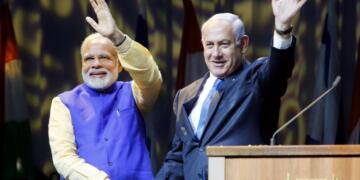Article 1 of the Indian Constitution defines India in the language of Bharat. The nomenclature of the ‘modern state’ on the historical lines accumulates the centuries of history, culture, and civilization. Further, the insertion of the word ‘Bharat’ in the definition of this modern nation-state speaks volumes about the term. The common consciousness of the pain, happiness, attack & defence against invaders, practices of Sanatan Dharma, its ancient beautiful art, culture & architecture, and feeling of belongingness with everything that belongs to our history culminate into the unexpressed emotional attachment ultimately giving rise to the nation and the nation’s high standard of the cultural living term into a civilizational state.
Jews had no state, but nationhood before 1947
Speaking at the launch of the book Ganga: The River of Sanatan Civilization by author-historian Neera Misra, the NSA (National Security Advisor) of India said that “a nation is built by the collective consciousness of the people who identify themselves as a unique entity – they take pride in their past and dream of a future together. This is how a nation is different from a state- which has a territory, a flag, and an army”.
Further talking about the nature of Bharat he added “India is a civilizational state. Its bedrock is the common civilization where every language, ethnicity, and faith coexist. Our common heritage is thousands of years old. A commonly shared civilization can have differences in thoughts, ideologies, beliefs, languages, and ethnicity. This concept of a nation may be accepted by many people as of now, but they will also realize when India will reach its potential”.
Citing examples of Jews, he said “before 1947, the Jews had no state, but their nationhood is 2,000 years old. They continued their struggle for nationhood because they had a unique identity. Even if a Jew was living in Cochin or Poland, he always thought of their nation on the basis of their culture and civilization.”
Read Also: ASI is going to bring proof of Mahabharat not being a fictional story
A state
When the concept of community governance on the line of law was developing, a polity architecture of state was simultaneously taking the shape. The common minimum understanding of governance becomes the law and a complete shape of that architecture called a state. It defined a modern state in terms of a definite polity, territory, and people. The purpose of the creation of the state was to govern the people on the line of modern democratic principles like life, liberty, and equality. As the developing population exerted the conflict on the line of economy, polity, and society. So, for the administration of the economy, society, order, and governance it became very important to create an institution and the idea of a state emerged.
A nation
A nation is the modern connotation of a historical Rashtra concept. The development of a state on the line of common history, culture, language, ethnicity, beliefs, or faith. It is the common consciousness of a group of people who in a way connect themselves from a common history.
Like practising the common way of life that is Hinduism, learning the same Veda and rituals, connecting itself with the common history of Ramayana & Mahabharata, building together with the beautiful Dravida and Nagara style of mandir architectures, and dancing to the tune of ancient classical music, defending itself from the Islamic invaders and more importantly fighting the war of independence against the Britishers.
When we term Bharat as a nation, we mean to say that Bharat is eternal, its existence is eternal and its people are eternal. In the early 1500 BC text, Rig Veda talks about the existence of Sapta Sindhu, a land encompassing seven rivers that is Bharatvarsha. And, later Vishnu Puran defines the boundaries of Bharatvarsha, from the northern Himalayas to the south Indian Ocean. It develops a consciousness of unity among the people of this Rashtra.
The feeling of belongingness for this motherland, where our ancestors lived, survived, and defended the land from the foreign invaders and kept the integrity and unity of this motherland intact. From 12th-century Islamic invasions to 19th-century despotic British rule, we & our forefathers defended this land for us. The development of this understanding culminates in the modern concept of nation.
A Civilization
We were suppressed, humiliated, enslaved & subjugated by the racial, colonial, and invading forces in the name of the white man’s burden. The burden to ‘civilize’ the socially & culturally backward people. It was believed by these racist people that they are culturally superior to us and they have every right to rule us till the time we are not civilized.
But the discovery of ancient texts like Arthshashtra, Veda, Puranas, and Upanishad gave the idea that we are culturally & socially more developed and civilized than these invaders. Moreover, the discovery of urban settlements like Mohenjo Daro and Harappa proved that the people of the Indus Valley Civilization were much more ahead of the contemporary time in terms of planning and standards of living. Their way of life early in 2500 BC was culturally standard and socially advanced.
Read More: Rakhigarhi expedition once again proves why India was fully developed thousands of years ago
The concept of Civilization originates from the term civilized means the life, culture, and society was well developed and matched the modern standards of peaceful coexistence of different communities. In a society where people are morally superior and culturally advanced, that’s what we were.
When we call Bharat, A Civilization Nation-State, what it means is that the nation’s people have been cultured, civilized, and connected with a common history. Its development in the modern state on the basis of the constitution is only for administrative purposes. Bharat & its people come from eternity and will go beyond eternity. Our history starts from the beginning of time and not from 15 August 1947.























